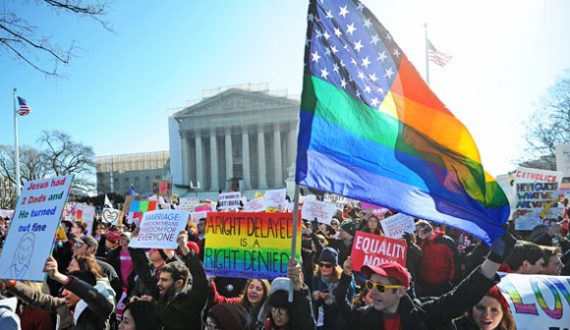Same-Sex Marriage Suffers A Legal Setback In Tennessee
A trial court judge in Tennessee is the first jurist since the Supreme Court's decision in U.S. v. Windsor to uphold a ban on same-sex marriage
A state court trial judge in Tennessee has become the first jurist to rule that a state law ban on same-sex marriage is constitutional since the Supreme Court’s decision inUnited States v. Windsor, breaking a streak of judicial opinions on the issue that had lasted for nearly fourteen months. Lyle Denniston summarizes the ruling, which came in a divorce case between two men who had been married in Iowa, a state where same-sex marriage is legal:
Roane County Circuit Judge Russell E. Simmons, Jr., of Kingston ruled in a case of two gay men who were married four years ago in Iowa and are now seeking a divorce in their home state of Tennessee. Unlike every other court ruling — federal or state — since the Supreme Court’s decision in United States v. Windsor in June 2013, the judge rejected the idea that the Windsor decision undercut state authority to ban same-sex marriages.
More than two dozen courts, from trial courts to state supreme courts and federal appeals courts, have faced that constitutional issue, and the string of decisions nullifying the bans was unbroken until the Tennessee decision.
Although Judge Simmons’s decision was limited to cases involving a divorce when the marriage itself is not recognized, he ruled in sweeping terms. He relied in part upon the Supreme Court’s summary decision in 1972 rejecting a constitutional challenge to a Minnesota ban, concluding that the Justices have never abandoned that ruling.
To the argument that more recent gay rights decisions have undercut that precedent, the Tennessee judge responded that the issue should more properly be raised in an appellate court with broader authority than that of a trial judge.
The decision also interpreted the Supreme Court’s decision in Windsor as not controlling in a case such as the one before him. “The Supreme Court,” he wrote, “does not go the final step and find that a state that defines marriage as a union of one man and one woman is unconstitutional. Further, the Supreme Court does not find that one state’s refusal to accept another state’s valid same-sex marriage to be in violation of the U.S. Constitution.”
Besides rejecting a challenge to the Tennessee ban based on a claim of illegal discrimination, Judge Simmons turned aside an argument that the Constitution’s Full Faith and Credit Clause required Tennessee to recognize a same-sex marriage performed in another state.
In some sense, it was inevitable that there would be a judicial ruling adverse to the marriage equality movement. In some sense, the law of averages made such an event inevitable that at some point some set of clients in one of these cases would end up before a Judge that did not see the arguments the same way that the other Judges who have heard these case have seen them. In fact, in each of the three opinions from the Circuit Courts of Appeal that have come down on this issue, there has been one Judge in each of the three Judge panels that dissented from the holding striking down the ban. That’s three Judges right there out of a total of nine, even though each of them were in the minority. Given that it was inevitable that we’d come across a trial level judge somewhere who would see a case like this in much the same way.
This Judge in Tennessee isn’t the only potential setback in the marriage equality fight that came to light last week. On Wednesday, the Sixth Circuit Court of Appeals heard appeals in same-sex marriage cases involving four separate states, and there has been much discussion since then about the possibility that the panel that heard these appeals may not be sympathetic to the marriage equality case:
The heady era of the post-Windsor winning streak may soon come to a crashing halt.
That’s the message that Judge Jeffrey Sutton seemed to telegraph during Wednesday’s gay marriage oral arguments at the 6th Circuit. Sutton is the swing vote on the circuit panel: To his left is Judge Martha Craig Daughtrey, a Clinton appointee and staunch liberal; to his right is Judge Deborah Cook, a thoroughly right-wing George W. Bush appointee. Sutton, also placed on the bench by Bush, is a genuine conservative and a former clerk of one Justice Antonin Scalia. (Scalia calls him ”one of the very best law clerks I ever had.”) But ever since Sutton upheld Obamacare in 2011, he’s been lauded on the left for his judicial independence.
Will that independence lead Sutton to strike down gay marriage bans in Michigan, Kentucky, Ohio, and Tennessee? Or will his conservatism push him to uphold the states’ laws? Based on Wednesday’s arguments, marriage advocates have good reason to worry. Unlike Cook, who clearly viewed gay marriage prohibitions as a rational state policy, Sutton seemed to scowl at the prospect of excluding an entire class of people from marriage. But unlike Daughtrey—who fiercely questioned the state’s interest in discriminating against gays at every turn—Sutton appeared exceedingly hesitant to bring gay marriage to America through judicial fiat.
Sutton has two hang-ups. The first is not terribly unreasonable. In a 1972 case called Baker v. Nelson, the Supreme Court dismissed a challenge to Minnesota’s gay marriage ban “for want of a substantial federal question”—that is to say, the court didn’t see a constitutional flaw in the ban. The case was decided through a summary affirmance of a lower court ruling, meaning the justices didn’t hear arguments or write a real opinion. But a summary affirmance is generally considered to be binding precedent on lower courts.
You might think that Justice Anthony Kennedy would confront Baker—the only Supreme Court precedent to deal directly with the merits of state gay marriage bans—when he overturned DOMA. But instead, he ignored it, perhaps in an effort to leave the whole question of state-level bans for another day. Every district court that has since struck down these bans worked around Baker by citing a somewhat ambiguous loophole: A summary affirmance might not be controlling precedent when it has since been undermined by “doctrinal developments.”
The question for Sutton, then, is simple: Does the trio of great gay rights cases (Romer, Lawrence, and Windsor) render Baker’s holding completely moot? Or does Baker remain binding precedent? Sutton seemed to lean toward keeping Baker on life support for now and letting the Supreme Court pull the plug, noting:
Even when you see one line of cases crumbling, lower courts aren’t allowed to infer, and anticipatorily overrule, this other line of cases. So as a matter of hierarchy, aren’t we stuck with Baker?
But then Sutton seemed to walk back his statement, musing that “the legal reasoning in other cases”—Romer, Lawrence, and especially Windsor—were “totally inconsistent with Baker.” At the end of his colloquy on the topic, he seemed a little stumped, and more than a little frustrated.
Dale Carpenter also believes that the panel, which is dominated by two George W. Bush appointees one of which is Judge Sutton, is likely to uphold the bans:
First, I think Judge Sutton is most apt to accept the view that the Supreme Court’s 1972 summary refusal to hear an appeal in Baker v. Nelson, a case in which the Minnesota Supreme Court rejected a same-sex marriage claim, is still binding on lower courts. The main argument against that view has been that significant doctrinal changes since 1972 have eroded the precedential authority of Baker. Sutton suggested that he thought things were a bit murky, but that lower courts were probably still bound by it. If that’s the basis for his opinion, it could actually be a quite brief decision simply rejecting the claims as precluded by Baker. It would then avoid all of the difficulties in deciding the substantive merits of the same-sex marriage claims, like whether there’s a fundamental right to marry, or whether sexual-orientation discrimination should be subject to heightened scrutiny, or whether there’s animus in state constitutional amendments, or whether there’s even a rational basis for laws limiting marriage to opposite-sex couples. If Baker controls-a conclusion all of the other federal courts have rejected since Windsor-then the Sixth Circuit is bound by it regardless of the merits. The Supreme Court, of course, will not be so inhibited and any opinion along these lines by the Sixth Circuit would be a parenthetical in a footnote in the history of these cases. If same-sex marriage advocates are going to lose in the Sixth Circuit, as appears likely, the least harmful loss would be one grounded on Baker.
Second, if the merits are reached, Sutton appeared ready to rule against the plaintiffs (though this is more doubtful). He seemed quite sympathetic to the policy arguments for same-sex marriage, but didn’t embrace the argument that the fundamental right to marry includes same-sex couples. He also doubted that there wasn’t at least a rational basis for existing marriage laws. He also leaned toward the view (although again this isn’t certain) that Sixth Circuit precedent precluded a holding that anti-gay discrimination is suspect.
(…)
Judge Sutton repeatedly pressed same-sex marriage attorneys on whether it would be better to pursue the cause through legislatures and popular votes. As a matter of strategy, it’s a fair point that a few of us have repeatedly made over the years. But once litigation begins-and there’s no central committee making strategy choices-it’s not the role of judges to render opinions based on their advice about how a movement might best achieve its goals. (This is distinct from the Burkean point that judges should be humble about social change and about the confidence with which they make important decisions in constitutional-law cases.)
A related response is the one made plaintively by the lawyer for the same-sex couples. Representing a man whose husband’s Ohio death certificate did not record their marriage, he argued that human dignity required recognition now. “It’s the last record of a person’s life on this Earth,” he said, and the record was wrong about one of the most important statuses one can have. “Allow these men to rest in peace.” When Sutton said that it would be better to allow change to proceed over time as it has, the Ohio lawyer’s voice gained an urgency. “I represent four couples. Their kids deserve two parents. They deserve them today.” The lawyer for the Michigan couples became emotional, almost choking up as she spoke about how her clients live in “fly-over country” where no progress is being made for gay men and lesbians.
An adverse ruling from the Sixth Circuit would obviously be something of a psychological blow to the marriage equality movement. After more than a year of positive legal and political developments it would be something of a setback for the movement in general and, of course, for the Plaintiffs involved in the cases before that Court. The so-called “traditional marriage” crowd would, of course, hail it as a great victory for them and it would likely provide them with some sense of hope in the face of a long, long string of legal and political defeats. At the same time, though, I don’t think it would be as big a deal as it is likely to be treated if it in fact comes. Nothing that happens in the Sixth Circuit will erase the gains that advocates for marriage equality have made over the course of the last two years. Indeed, if anything, such a loss seems likely to only make the advocates for state initiatives to overturn state-law bans at the ballot box such as the one that is in the works in Colorado more determined to push forward.
From a legal perspective, a defeat at the Sixth Circuit would in some sense be meaningless. While the fact of the string of lower court victories is not in and of itself legally relevant, such an overwhelming display of judicial opinion would arguably be persuasive to the only audience that matters in the legal battle for marriage equality at this point, the Supreme Court of the United States. The Circuit Court of Appeals decisions that struck down marriage bans in Utah, Oklahoma, and Virginia are now all headed to the Justices. It’s likely, in fact, that the petitions that the parties in these case could very well be before the Justices before the Sixth Circuit issues its opinion in this matter, which may not be until October or November at the earliest. In each of those three cases, all the parties have stated that they will be arguing in favor of the Court accepting the cases for review. If the Sixth Circuit does uphold the state laws before it in those four cases, then it would make it more likely that the Supreme Court will take the Utah, Oklahoma, and Virginia cases since there would now be a Circuit split (although as I noted before, there is already a Circuit split thanks to a pre-Windsor) decision from the Eighth Circuit Court of Appeals). This Tennessee case, meanwhile, will make its way through the appellate process in the Volunteer State but will have no real impact on the national legal debate on the issue.
So yes, there has been a setback in Tennessee and there could be one in the Sixth Circuit, but the political direction of the marriage equality debate seems to be headed in an obvious direction, and the legal battle depends, in the end, on whether Justice Anthony Kennedy will take the logic of his opinions in Roemer, Lawrence, and Windsorto their logical conclusion.
You can read the Tennessee opinion here, and listen to the oral argument in the Sixth Circuit cases here.






What were the plaintiffs doing in STATE court in Tennessee in the first place?
@Anderson: Looking for exactly this: a judge who doesn’t believe in federal supremacy.
@Anderson:
That’s why good lawyers matter. They had a better chance in federal court.
Looks like there will be a circuit split after all.
@Anderson:
The case was a divorce. There is no federal divorce court.
What has to happen to get this to Tennessee’s court of last resort?
Ahhhh, gotcha, Stormy. Makes sense.
@Anderson:
Frankly, he should have just dismissed the case for mootness, since they were seeking the termination of a marriage the state doesn’t recognize as existing to begin with. From the standpoint of the state of Tennessee, there’s no actual issue to be adjudicated.
Wow. Thank goodness there is still a judge out there fighting his lonely battle to keep the poor Christians from being persecuted by the fact that somebody else can do something loving and completely tangential and irrelevant to their own lives. Without these distractions said Godly Persons might be forced to look in the mirror.
Really, do gay marriage advocates want to hang it on “doctrinal changes since 1972”? I was unaware that the earlier decisions hung on such tenuous work arounds. Seems to me a nice conflict and a bit of adversarial process would be good for the issue. Assuming they think the SCOTUS will clean up the precedents in a favorable way. Heck, it might even cause this to be done right, through the legislative process.
Now, me I say, we legalize it all then push stringent enforcement of the adultery laws on all married couples, plus severely limit the reasons that justify the granting of divorce. Or, we could just look at why the State involved in licensing marriage at all.
Well, it’s like that ole boy in Alabama said, “You want it? You got it. I’ve been through two divorces myself.”
Unless opponents of SSM want to note the irony of needing the blessings of the state to seek a divorce, I don’t see any victory for them to hail here. Stormy’s observation is on point–this is moot, they are seeking dissolution from an entity that never recognized the union to begin. How can the state part what it has not joined?
Usually I have to say “Why is it always Florida.”
Then I thought “How was this not Florida?!”
Then I realized it WAS Florida:
http://www.tampaattorneys.org/blog/2014/05/13/hillsborough-county-judge-denies-sex-divorce/
It’s cute that Tennessee law explicitly rejects its full faith and credit obligations under the federal constitution as if it’s opt-out.